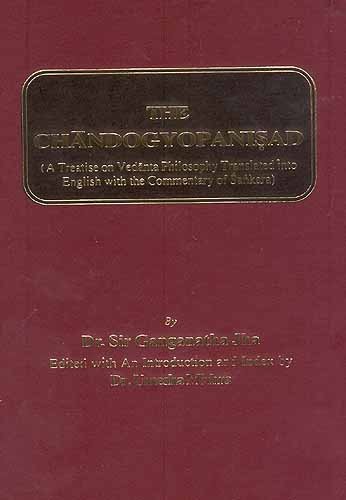Chandogya Upanishad (Shankara Bhashya)
by Ganganatha Jha | 1942 | 149,749 words | ISBN-10: 8170842840 | ISBN-13: 9788170842842
This is the English translation of the Chandogya Upanishad, an ancient philosophical text originally written in Sanksrit and dating to at least the 8th century BCE. Having eight chapters (adhyayas) and many sub-sections (khandas), this text is counted among the largest of it's kind. The Chandogya Upanishad, being connected to the Samaveda, represen...
Section 7.3 (third khaṇḍa) (two texts)
Upaniṣad text:
‘Mind is greater than Speech. Just as the closed fist holds two Āmalaka, or two Kola, or two Akṣa, fruits,—so does the Mind hold Speech and Name. And when one is minded in his mind to read the Veda, he reads it; when he is minded to perform actions, he performs them; when he is minded to desire sons and cattle, he desires them; and when he is minded to desire this world and also that world, he wishes for them. Mind is indeed the Self, Mind is the World, Mind is Brahman. Meditate upon the Mind.—(1)
Commentary (Śaṅkara Bhāṣya):
‘Mind’ here stands for the internal organ as endowed with the function of reflecting;—and this is greater than Speech. When the Mind performs the operation of reflecting, it urges the Speech to say what has to be said; hence Speech becomes included under Mind; and when one thing is included in another, by reason of the latter being larger in extent it becomes, on that very account, greater.—just as in the world, the closed fist holds two Āmalaka fruits, or two Kola—Badara fruits, or two Akṣa—Vibhītaka—fruits;—i.e. when the closed fist contains them, when they become included under the closed fist,—in the same manner, does the Mind hold Speech and Name, like the Āmalaka and other fruits.—When— at which time—one is minded in his Mind,—in his internal organ;—‘being minded’ stands for the desire to speak,—what is he minded,.—to read the Veda,—to recite it,—having thus made up his mind to speak,—he reads it;—similarly, when he is minded to perform actions,— i.e. has made up his mind to do them,—he performs them; when he is minded to desire sons and cattle,—i.e. having made up his mind to obtain them,—and obtain them by "having recourse to the means of obtaining them,—then he desires them,—i.e. he obtains Sons and other things;—similarly, when he is minded to desire this world and also that world,—seeks to obtain them by having recourse to the means of attaining them,—then he wishes for them—i.e. attains them,—Mind indeed is the Self;—it is only when the Mind is there—and not otherwise—that the Self either performs acts or enjoys experiences: hence the Mind is called the ‘Self’.—Mind is the World;—it is only when the Mind is there that the World is there, and also the adopting of the means to attain it; hence Mind is the World:—and for that reason Mind is Brahman.—Because all this is so, therefore meditate upon the Mind.—(1)
Upaniṣad text:
‘One who meditates upon the Mind as Brahman, becomes free to act as he wishes in the sphere within reach of the Mind;—for one who meditates upon the Mind as Brahman.—‘Revered sir, is there anything greater than Mind?’—‘Certainly, there is something greater than Mind’. ‘Explain that to me, Revered sir’.—(2)
Commentary (Śaṅkara Bhāṣya):
‘One who meditates on the Mind etc., etc.’—as before.—(2)
End of Section (3) of Discourse VI1.
